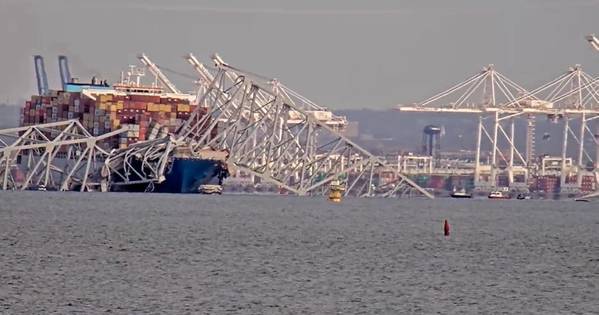
The containership allision that caused the collapse of the Francis Scott Key Bridge in Baltimore could cause "significant disruption" to shipping supply chains, according to industry analyst Xeneta.
The 10,000 TEU Singapore-flagged Dali was operating on a 2M alliance service between Baltimore and the Far East when it struck the bridge around 1:35 a.m. on Tuesday, sending cars and people plunging into the river below.
"The immediate focus is the rescue operation, but there will clearly be a highly-complex recovery phase and investigation to follow and we don't know what impact this will have on operations at the Port of Baltimore," said Emily Stausbøll, market analyst at Xeneta.
Kevin Cartwright, the spokesperson for Baltimore City Fire Department, said as many as 20 people could be in the river along with "numerous vehicles, and possibly a tractor-trailer or a vehicle as large as a tractor-trailer, (that) went into the river."
"This is a mass-casualty, multi-agency event," he said. "This operation is going to extend for many days."
Maryland Governor Wes Moore declared a state of emergency to quickly deploy federal resources to deal with the emergency.
Traffic was suspended at the Port of Baltimore until further notice, Maryland transportation authorities said.
Baltimore is the busiest U.S. port for car shipments, handling more than 750,000 vehicles in 2022, according to port data.
In terms of container shipping, Baltimore is not among the largest U.S. East Coast ports, Stausbøll said. "It still imports and exports more than one million containers each year so there is the potential for this to cause significant disruption to supply chains," she added.
Stausbøll said the incident adds to industry concerns amid impacts from drought in the Panama Canal and conflict in the Red Sea, which saw rates increase by 150%.
*"It is likely other larger U.S. East Coast ports such as neighboring New York/New Jersey and Virginia can handle additional container imports if Baltimore is inaccessible, which may limit any impact on ocean freight shipping rates. However, there is only so much port capacity available and this will leave supply chains vulnerable to any further pressure," Stausbøll said.
"The question is how quickly ocean freight carriers can put diversions in place, particularly for vessels already en route to Baltimore or containers at the port waiting to be exported."




